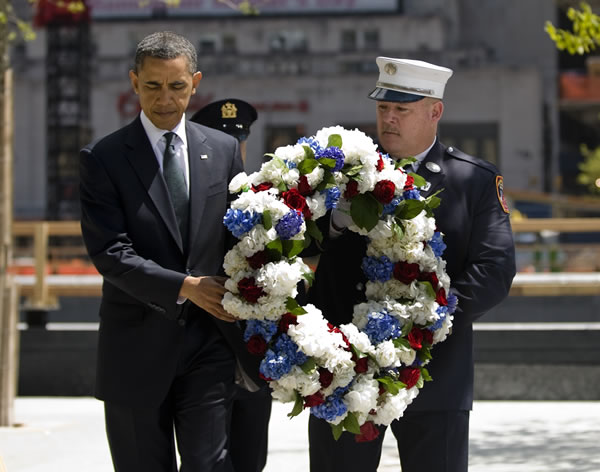By Ed Koch
In his address to Congress after the Japanese attacked Pearl Harbor on Dec. 7, 1941, President Franklin D. Roosevelt said it was “a date which will live in infamy.” Nine Eleven is likewise a date that will live in infamy. The war with Japan lasted almost four years. The war that began on 9/11 with the Islamist terrorist world is now 10 years old with no end in sight.
Islamist terrorism now exists in 62 Muslim countries and is supported by millions of fanatics. That campaign of terror is also supported by homegrown Islamist terrorists in the U.S. and European countries, and we have seen major acts of homegrown terrorism in the U.S., Great Britain and Spain, by those born and raised in Western countries.
Those who suffer most from Islamist terrorism are Muslims, sometimes Sunni and other times Shiite. Those two branches of Islam have been engaged in a civil war for centuries. Muslims have been killed by the tens of thousands in Iraq, Afghanistan, Somalia, Yemen, etc., by other Muslims in their ongoing religious civil war. Muslim citizens in Western countries suffer unfairly from being viewed by many fellow citizens as a potential fifth column.
Do we of Western civilization have the intestinal fortitude to keep fighting generation after generation to preserve our values and our liberties? Or will we ultimately, in effect, surrender.
The killing of Osama bin Laden on May 2, 2011, by the U.S. Navy Seal team has had little or no effect on the morale of the adherents and supporters of al Qaeda. For his followers, he is now a martyr in terrorist heaven, where they all hope to end up. The “Arab Spring” events have increased the power of the terrorists.
In Egypt, the opponents and successors in government to former Egyptian President Hosni Mubarak, an authoritarian leader but longtime friend of the U.S., are overwhelmingly Islamists. When the so-called “Arab Spring” uprising spread to Egypt, we quickly dropped our support of President Mubarak, naively forgetting that his opponents are not friends of this country and want to end Egypt’s peace with Israel.
The New York Times of Aug. 21 reported:
“By removing Mr. Mubarak’s authoritarian but dependably loyal government, the revolution has stripped away a bulwark of Israel’s position in the region, unleashing the Egyptian public’s pent-up anger at Israel over its treatment of the Palestinians at a time when a transitional government is scrambling to maintain its own legitimacy in the streets.”
We will soon see if the Libyan rebels who appear to have toppled Muammar el-Qaddafi — he should have been assassinated by our special forces long ago — will be any different than their oppressor.
I do not mean to suggest that we should not support popular uprisings. My point is that we must judge each situation on its merits and not immediately conclude that those who take to the streets in the Arab world are like those who took to the streets to fight the Soviet Communist governments in Czechoslovakia, Hungary, Ukraine and elsewhere.
In the case of Syria, the popular uprising is most likely in the U.S. interest. However, we have been exceedingly slow in throwing our support behind the Syrian people’s efforts to topple a brutal regime that is a close ally of Iran. President Bashar al-Assad has ordered the killing of his own people. His soldiers have shot down several thousand of them in the streets of major Syrian cities — men, women and children. He ordered the Syrian Navy to bombard the seaside city of Latakia, inflicting civilian casualties.
The Western world now demands that Israel engage in peace talks with the Palestinian Authority that now includes Hamas, which is described by Western countries as a terrorist organization. While President Obama has demanded that Israel return to the pre-1967 borders with “swaps,” Hamas believes that Tel Aviv is part of the Palestinian inheritance, and that every Jew who entered historic Palestine after 1917 must be expelled. Yet, Western nations expect Israel to negotiate with Hamas, which is reminiscent of Britain and France insisting at Munich that Czechoslovakia negotiate with Hitler.
If we are willing to pressure Israel to negotiate with a terrorist organization and we support Afghanistan’s negotiating with the Taliban, another terrorist group, can we be certain that our president won’t ultimately direct Secretary of State Clinton to negotiate with the Islamist terrorists to achieve peace in our time? Iraq, which we liberated from its oppressor Saddam Hussein, is now aligning itself with Iran and Syria.
It was shocking to me to learn that every Democratic member of the House of Representatives elected in New York City voted against renewal of the Patriot Act. This act is the major law enforcement legislation used to uncover terrorists here and abroad. Fortunately, it passed in the House by a vote of 250 to 153 and in the Senate by a vote of 72 to 23. New York Senator Kirsten Gillibrand voted “aye” and Senator Chuck Schumer did not vote.
Do we have it in us to stand up for freedom, no matter how long it takes to achieve victory and no matter the cost in blood and treasure? I wonder.
Koch was mayor of New York City from 1978 to 1989, and is a longtime Villager






































